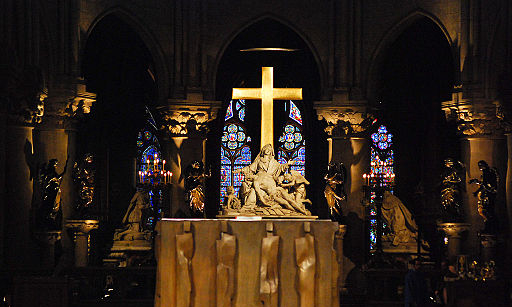Saint Paul tells us that we as Christians are baptized into Christ’s death and that by dying with him we rise along with him to new life (Rom 6:3-11). These are strange words. What is it to die and rise again? How can one live by dying? Tomorrow the Church celebrates the feast of the Triumph of the Cross, so it is a fitting time to reflect on this central paradox of the Christian faith.
Consider the following: First, death is an all-or-nothing affair. A man can give half of his money to support a cause. A missionary might lose half of his arms in a milling accident. My mother used to spend half of her time chauffeuring children. On the other hand, despite the expression, one cannot be half dead. Anyone who dies for a cause gives everything and retains nothing for himself. Any unsettled accounts are left to others. Jesus, by dying a gruesome death on the cross, gave everything. Even worse, he died a lonely death, abandoned by most of his followers and despised by the people who once welcomed him as a king. Our savior retained nothing for himself but the Father’s will, even when this will was for his Son to empty himself and accept the cross.
Most of us as Christians are never asked to die such a death. We usually have to die to ourselves a little bit each day. It begins when a child must obey her parents. It ends when a great-grandfather accepts the trials of old age. Each of us has attachments that God asks us to die to. Oftentimes, they are buried deep and play tricks on our thinking. We think ourselves righteous for holding a grudge, or refusing to change plans, or abandoning those whom we are supposed to love. Only by God’s grace can we abandon these deepest attachments. But the more we give them up, the more we become like Christ who gave everything in his death. Abandoning grudges, accepting the plans of others, and sticking by those whom we love fill us with a tremendous peace and free us to contemplate the God of love. The less we retain for ourselves, the more space we have for what matters the most.
The second point is that Jesus went to the cross willingly. He could have called down twelve legions of angels (Matt 26:53) to crush the Roman empire and institute a theocracy on earth, with himself as the immortal emperor-God. Even as his last breath escaped him, he retained this power. He chose instead to complete the mission for which he came to earth. In his prayer in the Garden of Gethsemane, he did not accept the Father’s will grudgingly, as a last resort; instead, he accepted his Father’s will with firmness and resolve.
Although we lack authority over the angels of heaven, we do possess authority over ourselves. We can choose to accept the Father’s will out of love for him. A couple may not choose to have a child with special needs, but they can lovingly accept God’s plan. A man who loses his job unfairly may be unable to remedy the injustice, but he can take up his cross either with bitterness or with courage. By positively choosing to follow God despite the trials which he offers to us, we become his friends. We become heroes instead of victims. By dying we rise again in Christ. We triumph on the cross.
In his death, Jesus Christ turned what was most evil in the world—the death of the Son of God—to the greatest good, namely, eternal life poured out upon those who believe. We share in this life when we participate in Christ’s suffering by taking up our crosses in and through Christ, who is alive in us by grace. The more we give up, the more we receive. The more willingly we share in Christ’s suffering, the more fully we share in his glory. This is the triumph of the Holy Cross.
✠
Photo: The Modern Altar of Notre Dame, Wikimedia Commons







